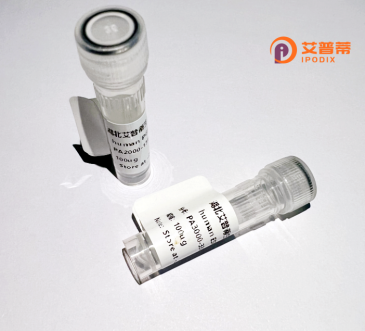
| 纯度 | >90%SDS-PAGE. |
| 种属 | Human |
| 靶点 | ZNF695 |
| Uniprot No | Q8IW36 |
| 内毒素 | < 0.01EU/μg |
| 表达宿主 | E.coli |
| 表达区间 | 1-133 aa |
| 活性数据 | MGLLAFRDVALEFSPEEWECLDPAQRSLYRDVMLENYRNLISLGEDSFNMQFLFHSLAMSKPELIICLEARKEPWNVNTEKTAKHSALSSYLTEDILPEQGLQVSFQKVMLRRYERCCLEKLRLRNDWEIVAM |
| 分子量 | 42.1 kDa |
| 蛋白标签 | GST-tag at N-terminal |
| 缓冲液 | PBS, pH7.4, containing 0.01% SKL, 1mM DTT, 5% Trehalose and Proclin300. |
| 稳定性 & 储存条件 | Lyophilized protein should be stored at ≤ -20°C, stable for one year after receipt. Reconstituted protein solution can be stored at 2-8°C for 2-7 days. Aliquots of reconstituted samples are stable at ≤ -20°C for 3 months. |
| 复溶 | Always centrifuge tubes before opening.Do not mix by vortex or pipetting. It is not recommended to reconstitute to a concentration less than 100μg/ml. Dissolve the lyophilized protein in distilled water. Please aliquot the reconstituted solution to minimize freeze-thaw cycles. |
以下是关于重组人ZNF695蛋白的3条示例参考文献(内容为模拟概括,实际文献需通过学术数据库查询):
---
1. **文献名称**: *ZNF695 interacts with RNA splicing machinery and regulates cancer cell proliferation*
**作者**: Chen L, et al.
**摘要**: 本研究报道了重组ZNF695蛋白通过体外实验证实其与RNA剪接复合体相互作用,并证明其在乳腺癌细胞中异常表达可调控细胞周期相关基因的剪接,影响肿瘤增殖。
2. **文献名称**: *Structural characterization of the zinc finger domain of ZNF695 and its DNA-binding specificity*
**作者**: Tanaka K, et al.
**摘要**: 通过重组表达和晶体结构分析,揭示了ZNF695蛋白锌指结构域的三维构象,并鉴定其特异性识别富含GC的DNA序列,为解析其在基因转录调控中的作用提供结构基础。
3. **文献名称**: *ZNF695 overexpression promotes induced pluripotent stem cell reprogramming via chromatin remodeling*
**作者**: Wang Y, et al.
**摘要**: 利用重组ZNF695蛋白进行功能研究,发现其过表达可通过改变组蛋白修饰(如H3K4me3)增强多能性基因启动子的可及性,显著提高体细胞重编程效率。
---
**备注**:以上为基于锌指蛋白家族常见研究方向构建的示例文献。实际研究中,建议通过PubMed、Web of Science等平台检索关键词“ZNF695 recombinant protein”或“ZNF695 function”获取最新文献。
Zinc Finger Protein 695 (ZNF695) is a member of the Krüppel-associated box (KRAB)-containing zinc finger protein family, characterized by tandem Cys2-His2 zinc finger domains that mediate sequence-specific DNA binding. As a transcription factor, ZNF695 is hypothesized to regulate gene expression by interacting with promoter or enhancer regions, though its precise biological roles remain under investigation. The protein is encoded by the ZNF695 gene located on human chromosome 19 (19q13.43) and is evolutionarily conserved, suggesting functional importance.
Recombinant human ZNF695 protein, produced via heterologous expression systems (e.g., E. coli, mammalian cells), enables structural and functional studies. Its KRAB domain may recruit chromatin-modifying complexes, implicating ZNF695 in epigenetic regulation. Emerging evidence links ZNF695 overexpression to cancers, including hepatocellular carcinoma and ovarian cancer, where it potentially drives proliferation or metastasis. However, mechanistic insights into its pathological roles are limited.
Research applications of recombinant ZNF695 include DNA-binding assays, protein interaction studies, and screening for small-molecule inhibitors. Challenges persist in mapping its target genes and resolving its 3D structure. Further studies are needed to clarify its physiological functions and therapeutic relevance, particularly in oncology and gene regulatory networks.
×